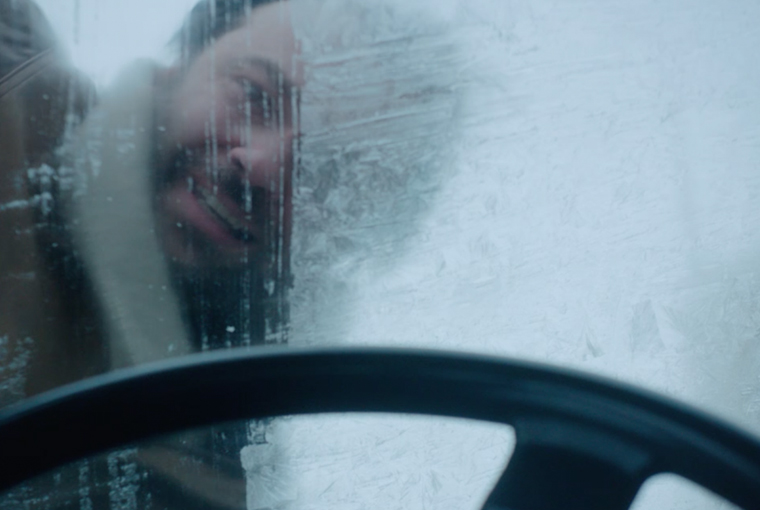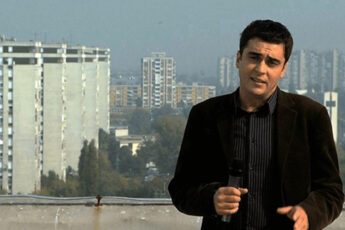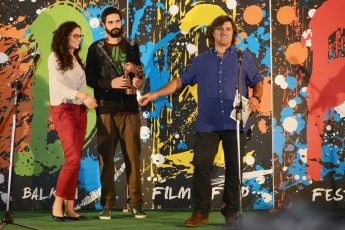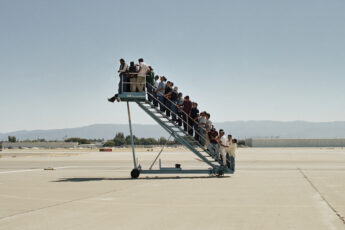“Is There Any Memory That Would Warm Me Tonight?”
Ismet Sijarina’s Cold November (Nëntor i ftohtë, 2018)
Vol. 95 (May 2019) by Isabel Jacobs
Winter is coming to Pristina. And this year it is a freezing cold one. Central heating is shut down and people are forced to sit in their winter coats in cold flats. Sometimes electricity fails as well. Everything is stuck under a muting blanket of snow; the sky is icy blue. In this cold and desperate environment, everything seems disconnected. Pristina’s inhabitants escape the hostile outside world and take shelter amidst their families. At the beginning of Cold November, we see the protagonist Fadil (Kushtrim Hoxha) defrosting his car; gradually we discern him through the snow-blind windshield. Throughout the film the windows are steamy, there is no clear sight anywhere, only frost and chilly mist.
Ismet Sijarina’s second feature film is set in the early 1990s, at a time when Kosovo gradually loses its autonomy and comes under Serbian control. After installing a new constitution, the Serbian government under Slobodan Milošević shuts down Kosovo’s assemblies, schools and Albanian-speaking media outlets. Several state-owned companies are reorganized and begin to be managed by the authorities in Belgrade. From 1990 onwards, Albanian workers, doctors and teachers are removed from their positions. In consequence, many Albanians refuse to continue working for the government. In the years before the outbreak of the war, Kosovo is in a constant state of emergency. The presence of Yugoslav troops is gradually increased, and violence emerges. Cold November’s plot is based on Sijarina’s memories of his own childhood during the years leading up to the bloody disintegration of Yugoslavia.
At the outset of Cold November, a new manager, the Serb Nikola – played by well-known Bosnian actor Emir Hadžihafizbegović – is introduced to the archive where Fadil works. In an act of collective resistance against the Serbian hegemony, most Albanian colleagues sign the “blue paper” announcing their voluntary withdrawal from their jobs. Fadil is aware that there is no good solution in the decision he too, must make, but rather two wrong possibilities. In the office, a portrait of Milošević hangs like a sword of Damocles over his head as Nikola pressures him into taking a stand. Owing to a sense of familial duty, Fadil reluctantly decides to continue working for the Serbian government. His decision marks the expulsion of Fadil and his family from the Albanian community; at the same time, he stays on as the only Albanian in the company and is henceforth confronted with increasing distrust on the Serbian side.
Towards the film’s beginning, Fadil and his wife witness the brutal arrest of a young man from the neighborhood who is deported by the Serbs. Later we learn that the man is brought back dead; his family is not allowed to open the coffin and the authorities claim that he has committed suicide. Soon, Kosovo’s population begins to peacefully protest against the Serbian occupation. In the evenings, during curfew hours, they peacefully demonstrate with keys, candles, spoons and plates on their balconies. These scenes of protest and union belong to Cold November’s strongest moments. Steadily though, the viewer realizes, the Albanian community itself splits apart; everyday life is characterized by mutual denunciation and increasing poverty. Pristina’s frosty streets and buildings enhance the toxic atmosphere of suppressed aggression, distrust and desperation.
The use of music plays a central role in Cold November. One recurring motif is Petrit Çarkaxhiu’s song Nëntor i ftohtë: “Is there any memory that would warm me tonight? / Is there any safe path for me to look up? / Can’t you tell me, is there a memory to give us a meaning? / Tell me, where could I find the strength to sing today? / The Cold November echoes inside me.” It is Cold November’s melancholic and yet soothing hymn which Fadil and his son play on the guitar in several situations. The film focuses on the warm intimacy of family life which forms a stark contrast to the increasingly freezing social climate. Although the depictions of family life are touching most of the time, their stylization sometimes comes off as forced, almost tacky. Fortunately, the director never loses his dark sense of humor and can therefore steer away his film from kitsch.
In a key scene, Fadil encounters his old friend and colleague Arsim (Fatmir Spahiu) in the corridor of their working place, immediately after both men have taken their decision. Arsim has just proudly signed the blue form; when he realizes Fadil has chosen to stay, he says: “Don’t put shame on your family, Fadil.” From that point on, the fatal consequences of Fadil’s decision become apparent. He is now considered a traitor and spy among his Albanian neighbors, relatives and friends. His family cannot leave the house without being humiliated in increasingly violent ways. First, his neighbors throw eggs on his car and his children become outsiders in school, then someone slashes the tires of his car and finally he is brutally beaten up in the corridor of his own house. Although his decision was bound to carry dire consequences, Fadil clearly sees the lack of a better option: “If I had a choice, I would do it, but I don’t”.
This feeling of claustrophobia is mirrored by the film’s aesthetics. This effect is achieved, firstly, by the unusual aspect ratio of 4:3, a frame that provides only limited space for the characters and creates a feeling of being trapped. There is no space to move, the bodies almost fill the whole space, the world around them seems narrow and restrictive. Another significant aesthetic tool is the contrast between cold and warm colors. The outside world, the streets, the school and Fadil’s office are all dipped into frosty and blueish colors, while the flat is lit with warm, red light, creating an atmosphere of security and love. Inside the houses we feel a warm intimacy which is threatened by the hostile and cold outside world.
The Yugoslav Wars progress and, in the archive, Fadil comes across a box labeled “Vojna tajna” (military secret). Among dreadful photographs depicting the cruelties of the war and lists with hundreds of names, Fadil finds a file describing the following event: “2nd November 1991. Mario Srna, 58 years old. The only one who escaped and survived the village of Ovcar near Vukovar. Hundreds of other people, mainly of Croatian nationality, were murdered and all evidence was destroyed.” Sijarina draws on authentic material from the Hague tribunal, though the names of the victims have been changed. In a very touching scene, Fadil’s Serbian colleague Branka (Gordana Boban) visits Muhamet at home and says to him: “My heart is breaking into pieces. What can we do but to pray to God that all of this situation is over soon, and we take care of each other, Muhamet. We are all humans.”
In the end of the film, Çarkaxhiu’s song returns, as the viewer is confronted with a completely open end that provides no clear solution to the plot. What can be considered as shortcomings of Sijarina’s film — an occasional overacting and heroization of the family as a space of refuge — is definitely compensated by the excellent camera work by cinematographer Sevdije Kastrati, a talented female cinematographer from Kosovo. There are beautiful long shots and sometimes the camera tenderly moves over small details of the interior or the character’s faces and bodies. Cold November not only gives an authentic insight into the atmosphere in Kosovo during the early 1990s, but also tells a universal story about the difficulty to resist as an individual against the path taken by the masses.




Leave a Comment